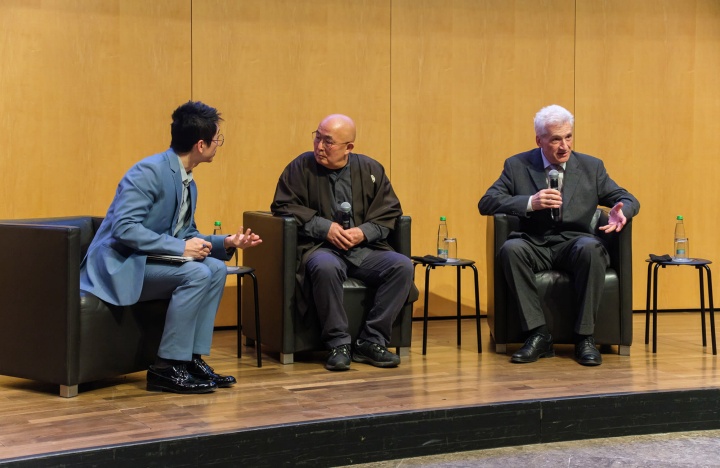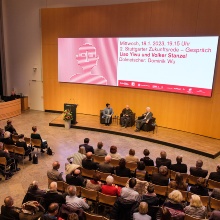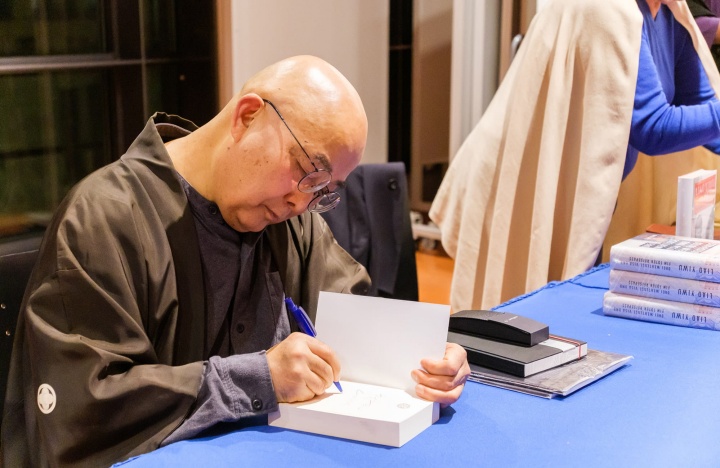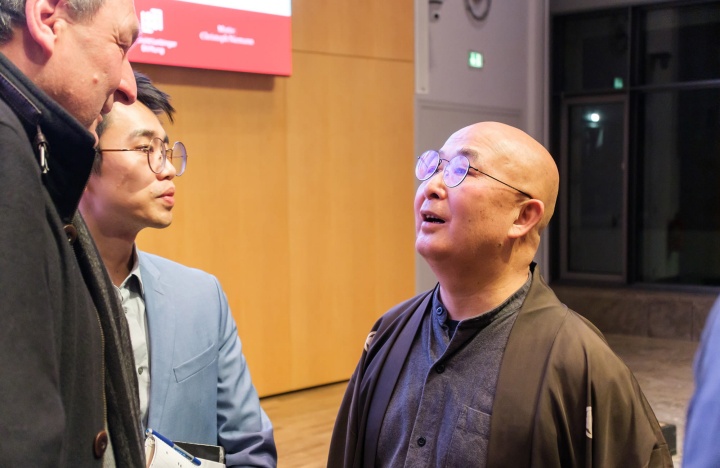Stuttgart's spacious city hall was filled to capacity. As Dr. Elke Uhl, executive director of the University of Stuttgart's International Center for Cultural and Technological Studies (IZKT), reports, "Over 500 people who attended the event and around 900 livestream viewers were keen to hear about Liao Yiwu's experiences in Chinese prisons and what future scenarios he envisages for the country."
The poet Yiwu is known around the world for his literary works in which he is critical of the regime, criticizing both the Chinese government and society in his narratives. The second Stuttgart Future Speech "Invisible Warfare. How a book conquers an empire", which was organized by the consortium of partners consisting of the IZKT, the Literaturhaus Stuttgart, and the Evangelisches Bildungszentrum Hospitalhof Stuttgart, was a brilliant follow-up to Daniel Kehlmann's first Stuttgart Future Speech two years ago. Whereas Kehlmann explored the writing capabilities of artificial intelligence in 2021, this year the human rights activist discussed the digital surveillance technologies that have been drastically expanded in the guise of so-called "health apps" in the wake of the pandemic in China.
Imprisoned for a poem
Yiwu is able to provide unique insights into the political and social situation in China based on his own personal experiences. He was incarcerated for four years after the publication of his poem "Massacre" in 1989, which was about the suppression of protests in Tiananmen Square. The audience sat enthralled as he described the violence, breakdowns, and suicide attempts experienced in the prisons. His experiences provide the context for what he now considers important: his writings, written secretly in prison. He first managed to smuggle them out of prison and then, 16 years later, out of the country, hidden in book spines. They form the basis of his Testimonials, first published in German in 2012 under the title Für ein Lied und hundert Lieder (For a Song and a Hundred Songs), for which he received the Geschwister Scholl Prize, and which has since been translated into numerous languages.

Fleeing to Germany
He faced an uncertain future following his release from prison, as writing is now even more dangerous than it had been during his incarceration. He decided to flee after several house searches and the confiscation of his manuscripts, but his initial attempts to leave the country failed. His contacts in the West and in Germany, such as Herta Müller, Wolf Biermann, and the S. Fischer Verlag, persuaded him to flee to Germany and he finally managed to escape in 2011. Liao Yiwu now lives in Berlin with his wife and child.
In search of truth
The writer reflects self-critically on what a book is able to achieve: can a book actually make a difference? The fact that Yiwu found himself in Stuttgart that evening is living proof of that. The speech itself, which will be published by Klett-Cotta Verlag this coming March, was intended as a contribution to overcoming the Chinese regime.
"The search for truth", Yiwu said, "cannot be extinguished". His personal contribution to combating an inhumane regime is to expose events covered up by the Chinese government, such as those that resulted in the Covid-19 pandemic.
From a policy of zero Covid to a zero caution
During his speech, he repeatedly stressed his expectation that China would use tanks to quash popular protests against the Zero Covid policy. The suspension of the zero Covid policy, he said, has resulted in overburdened crematoriums that are assigning cremation dates by lottery and desperate relatives who are cremating their dead outdoors. What this shows, he added, is that simply abandoning the population to the virus, which, with a nod to George Orwell’s famous novel, he refers to as "Covid 1984”, without medicines and vaccines is far more cruel, tantamount, in his view, to a weapon of invisible warfare.
The chronicler concluded his speech by saying that "no tyrant, be they Stalin, Putin, Hitler, or Xi Jinping, would win, because the dead would not be forgotten".
The future of China
The author then went on to describe his vision of China's future in a conversation with the former German ambassador in Beijing, Volker Stanzel, saying that he is in no doubt that the country will break apart because, "if it continues to grow, all living things on Earth will be under threat." He also added that "the best thing would be if China were to break up into a number of smaller countries".
Podiumsdiskussion digitale Überwachung
A panel discussion held the following evening focused on future scenarios for digital surveillance in Germany and Europe. The panel speakers included Stefan Bink, former State Commissioner for Data Protection and Freedom of Information in Baden-Württemberg, Katika Kühnreich, a political scientist and sinologist, and Michael Resch, Director of the High Performance Computing Center (HLRS). The panel agreed that convenient consumer behavior causes people to underestimate the dangers of digital surveillance and that certain decisions, such as a court ruling, should only ever be made on the basis of human judgment, not technology. They also stressed the importance of robust and effective data protection legislation.
About the Stuttgart Future Speech
According to Dr. Elke Uhl, the Stuttgart Future Speech is about the power of language, the struggle with intellectual resources, and the search for truth. Every two years, the public and prominent figures from the fields of literature, science, politics, society, and culture are invited to attend the Stuttgart Future Speech event to reflect upon topics of the future. The Stuttgart Future Speech forum is all about thinking ahead, considering the future, and presenting blueprints for society.




